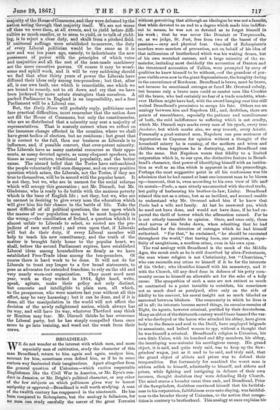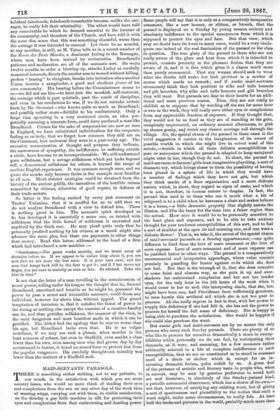BROADHEAD.
IATE do not wonder at the interest with which men, and more especially men of cultivation, study the character of this man Broadhead, return to him again and again, analyze him, account for him, sometimes even defend him, as if he in some curious way fascinated their imaginations. Apart altogether from the general question of Unionism—which excites respectable Englishman like the Civil War in America, or Mr. Eyre's con- duct in Jamaica, or Mr. Bright's political character, or any other of the few subjects on which politeness gives way to honest antipathy or approval—Broadhead is well worth studying. A man of the twelfth century has reappeared in the nineteenth. He has been compared to Robespierre, but the analogy is fallacious, for no man can study carefully the career of the great Terrorist
without perceiving that although an ideologue he was not a fanatic that while devoted to an end to a degree which made him indiffer- ent to means, he was not so devoted as to forget himself in his work ; that he was never like Dominic or Torquemada, or, as we judge, St. Just, free from two of the basest of the' passions envy and physical fear. One-half of Robespierre's murders were murders of precaution, not on behalf of his idea of that millennium of brotherhood which was his waking dream, but of his own wretched carcase, and a large minority of the re- mainder, including most decidedly the accusation of Denton and the threatened accusation of Tallinn, were prompted by envy of qualities he knew himself to be without, —of the grandeur of pur- pose visible even now in the giant Septembriseur, the haughty daring in the executioner of Bordeaux. Broadhead is brave, must be braver not because he sanctioned outrages or faced Mr. Overend calmly, but because only a brave man could so master men like Crookes till the bravo, who had certainly no fear of a trade vendetta, what- ever Hallam might have had, with the sword hanging over him still' waited Broadhead's permission to escape his fate. Others see as analogy between him and Napoleon III., and, doubtless, there are- points of resemblance, especially the patience and mercilessness'- of both, the cold indifference to suffering which is not cruelty, which Mr. Disraeli says marks every man of his epoch, every true' fundator, but which marks also, we may remark, every Asiatic. Personally a good-natured man, Napoleon can pass sentences of deportation to Cayenne for opinion without a thought of the household misery he is causing, of the mothers and wives and children whose happiness he is destroying, and Broadhead can do the same. But Napoleon wants that fidelity to a limited corporation which is, to our eyes, the distinctive feature in Broad- head's character, that power of identifying himself with an institu- tion as well as an idea which is apparent in all his proceedings. Perhaps the most suggestive point in all his confessions was his admission that he had caused at least one innocent man to be blown up—innocent, that is, even according to his own view of life and its morals—Poole, a man utterly unconnected with the steel trade, but guilty of harbouring his brother-in-law, Linley. Broadhead related this not as a crime, but as an incident, and seemed unable to understand why Mr. Overend asked him if he knew that Poole had a wife and family. At last he answered yea, which he need not have done, and would not have done, if he had ex- pected the thrill of horror which the affirmation caused. For he is not utterly insensible to opinion. Once, and once only, those steel nerves of his broke down, when admitting that he had subscribed for the detection of outrages which he had himself authorized. "For that," he exclaimed, "he should be execrated throughout the world," that having been, one perceives, a super- fluity of naughtiness, a needless crime, even in his own eyes.
The real analogy with Broadhead is the monk of the Middle Ages, the monk such as he is still described by ultra-Protestants, the man whose religion is not Christianity, but " Churchism," who can reconcile any crime to himself if it be for the interests of his Order ; who identifies himself with his monastery, and it with the Church, till any deed done in defence of his petty com- munity seems to himself an allowable act for the sake of a holy' cause. The sympathies of such a man are not extinct so much as contracted to a point invisible to outsiders, his conscience' not so much dead as paralyzed, alive only on the side of fidelity to his convent, his moral insight not so much blinded as narrowed between blinkers. The community in which he lives is all in all; its interests become sacred things, its enemies enemies of Right, its agents, however criminal, purified by their devotedness. Many an abbot of the thirteenth century would have banned the vas- sal who disobeyed or the baron who attacked his abbey, have given body to the flames and soul to the Devil, have employed brigands to assassinate, and bribed women to spy, without a thought that he was himself a criminal. Broadhead's religion is Unionism, his own little Union, with its hundred and fifty members, his abbey, the interloping non-unionist his sacrilegious enemy. His grand object, it is said, and quite truly said, was to keep up the Saw- grinders' wages, just as it used to be said, and truly said, that the grand object of abbots and priors was to defend their temporalities. But fortunately for mankind the worst man is seldom selfish to himself, admittedly to himself, and abbots and priors, while fighting and intriguing in defence of their own incomes, thought doubtless they were defending Holy Church. The mind craves a broader cause than cash, and Broadhead, Prior of the Sawgrinders, doubtless convinced himself that his faithful- ness to his corporation, faithfulness even unto slaying, was faithful- ness to the broader theory of Unionism, to the notion that compe- tition is contrary to brotherhood. This analogy at once explains his habitual falsehoods, falsehoods remarkable because, unlike the out- rages, he really felt their criminality. The abbot would have told any conceivable lie which he deemed essential to the interest of his community, and therefore of the Church, and have told it with the same dim sense that this was something shameful, worse than the outrage it was intended to conceal. Let there be no scandal, at any sacrifice, is still, as M. Taine tells us in a recent number of the Revue des Deux Mondes, a dominant feeling in the Romagna, where men have been trained by ecclesiastics. Broadhead's patience and moderation are all of the monastic sort. He waits twelve months to order a blowing-up, attacks Linley at carefully measured intervals, directs the secular arm to wound without killing, prefers " laming " to slaughter, breaks into irritation when another Union worries a sawgrinder, a good and obedient /rater of his own community. His bearing before the Commissioner seems to us—we did not see him—to have just the monkish self-restraint, the courage which is part quietude, part the result of discipline, and even in his revelations he was, if we do not mistake certain hints by Mr. Overend—who knows quite as much as Broadhead, and possibly rather more—faithful to his confraternity. Only a large idea operating in a very restricted circle, an idea per- petually assuming a concrete form, could have produced a man like Broadhead. Crimes for the sake of corporations are now so rare in England, we have substituted individualism for the corporate feeling so entirely, that we forget how common they still are on the Continent, how universal they were in a past-away age. The excessive concentration of thought and purpose they indicate, the narrowness of sympathy, the indifference to suffering outside a circle, have become to us incomprehensible. We still understand pure selfishness, but a savage selfishness which yet looks beyond self, a demoniacal selfishness for others, is beyond the range of modern English experience. It was common enough once, and we quote the monks only because theirs is the example most familiar to all men. Much stricter analogies could be obtained from the history of the ancient guilds, the narratives of the horrible crimes committed by citizens, otherwise of good repute, in defence of their trade secrets.
So bitter is the feeling excited by every just comment on Trades' Unionism, that it is needful for us to add that we do not analyze Broadhead with a view to defend him. There is nothing great in him. The monastic spirit developed as he has developed it is essentially a mean one, so tainted with selfishness that the little kernel of nobleness is encrusted and exydized by the thick rust. He may plead quite truly that he personally profited nothing by his crimes, as a monk might also advance the same plea, but there are payments in other things than money. Read this letter, addressed to the head of a firm which had introduced a new machine :—
"Gentlemen,—The game works merrily, and we brash away all obstacles before us. If we appear to be rather long about it, you see now that we are none the loss sure. It is your turn next, and the man that hangs back will be the first to get it ; and if I but move my finger, you are sent to eternity as sure as fate. Be advised. Take the hint in time."
Is not that the letter of a man revelling in the consciousness of secret power, rolling under his tongue the thought that he, Samuel Broadhead, unnoticed and humble as he might be, possessed the power to paw a secret and irresistible sentence, could doom any individual, however far above him, without appeal. The grand temptation of terrorism is, that it satisfies the thirst of power in the strong as nothing else except the exercise of a creative faculty can do, and thus gratifies selfishness, the meanest of the vices, in the most dangerous and most heartless mode in which it can be gratified. The Abbot had the apology that he was no worse than his age, but Broadhead lacks even that. He is no vulgar murderer, if we may use such a phrase, when murder is the least common of crimes, but even in Sheffield, even amidst a class lower than his own, even among men who had grown day by day accustomed to horror, it taxed an armed force to protect him from the popular vengeance. His carefully thought-out morality was lower than the instinct of a Sheffield mob.































 Previous page
Previous page